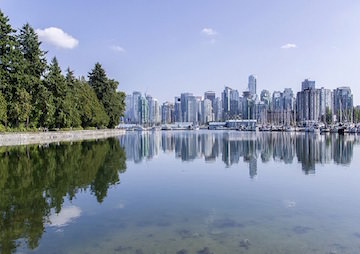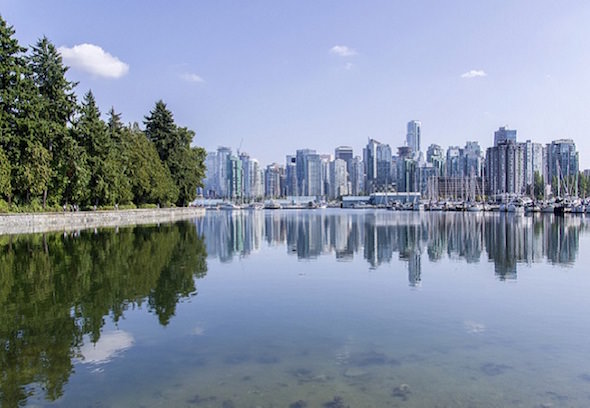Green City Vancouver Offers Clean Alternative to Tar Sands Boom
Canada has been dubbed an international disgrace for its climate change policies, but now one of its major cities is aiming to be the greenest in the world by 2020.
By Paul Brown, Climate News Network

A splash of green enhances the Vancouver skyline. (Ross G. Strachan via Flickr)
This Creative Commons-licensed piece first appeared at Climate News Network.
LONDON — In a country reckoned to have the worst climate policies in the industrialised world, one big city is setting out to defy central government and become 100% carbon neutral.
Vancouver, in British Columbia, Canada, wants to establish itself as “the greenest city in the world by 2020” by demonstrating that economic growth and the welfare of its citizens depends on developing renewables, rapid transit systems, and promoting cycling and walking to curb car use.
It is one of dozens of cities worldwide working towards improving the life of their citizens while reducing fossil fuel use, but it claims to have the most ambitious targets.
Many city administrations in Europe have the support of their governments, but in other countries — particularly Australia and Canada, where governments are actively promoting fossil fuels — cities are having to act alone.
A conference in Vancouver, attended by leaders from 45 countries, opens today to help the local government reach its goals.
Doubling green jobs
Among the “Green Vancouver” targets are doubling the number of green jobs in the city by 2020, from a 2010 baseline of 16,700, and making all new building in the city carbon neutral from 2020, while dramatically cutting emissions from existing buildings.
Progress towards meeting the city’s impressive list of targets includes reductions in air pollution, waste, water use and car journeys. Other aims are to provide a green space within five minutes walk for every citizen, planting thousands of trees, and growing food locally.
The city’s environment credentials go back to the 1970s, when there was a long battle to stop a freeway being built through the city. As a result, it is not possible to drive easily into the centre.
“The people who run Vancouver . . . are
business-savvy people who can see a vibrant green economy being a magnet for new business and forward-looking people”
Between 1996 and 2011, while the population in the city centre increased by 40%, there was a 25% decrease in the number of vehicle journeys, and a rise in the use of public transport, dedicated cycle routes and walkways.
Many other cities in the world that believe the way forward is to rid themselves of fossil fuels are attending to share experience — both of successes and failures.
That Vancouver is to become a centre of excellence is ironic, considering the fact that the federal government is seen as an international disgrace to the environment movement.
In 2011, it repudiated the Kyoto Protocol on emissions reduction targets, and has vigorously promoted the exploitation of oil from tar sands — the most polluting form of oil extraction, with high carbon dioxide emissions.
Power from renewables
In contrast, Vancouver, which has a population of 600,000, believes that all its power can come from renewables — although getting all heating and cooling and transport without using fossil fuels may take until 2040, depending on whether there is any help from central government.
One of the organisers of the conference, Shauna Sylvester, said: “When I first heard that Vancouver wanted to go 100% renewable, I thought it was a dream, but having looked at the possibilities I am a total convert.
“The people who run Vancouver do not have normal political affiliations. They are a bunch of business-savvy people who can see a vibrant green economy being a magnet for new business and forward-looking people. They are neither Labour nor Conservatives, but new progressives.”
Sylvester works at the Simon Fraser University Centre for Dialogue’s Renewable Cities Initiative, one of a number of organisations that aim to bring cities together to tackle climate change, because many local leaders believe that governments do not have the political will to do so.
Among those supporting the conference is the United Nations Environment Programme, which has its own campaign to green cities.
Your support matters…Independent journalism is under threat and overshadowed by heavily funded mainstream media.
You can help level the playing field. Become a member.
Your tax-deductible contribution keeps us digging beneath the headlines to give you thought-provoking, investigative reporting and analysis that unearths what's really happening- without compromise.
Give today to support our courageous, independent journalists.






You need to be a supporter to comment.
There are currently no responses to this article.
Be the first to respond.